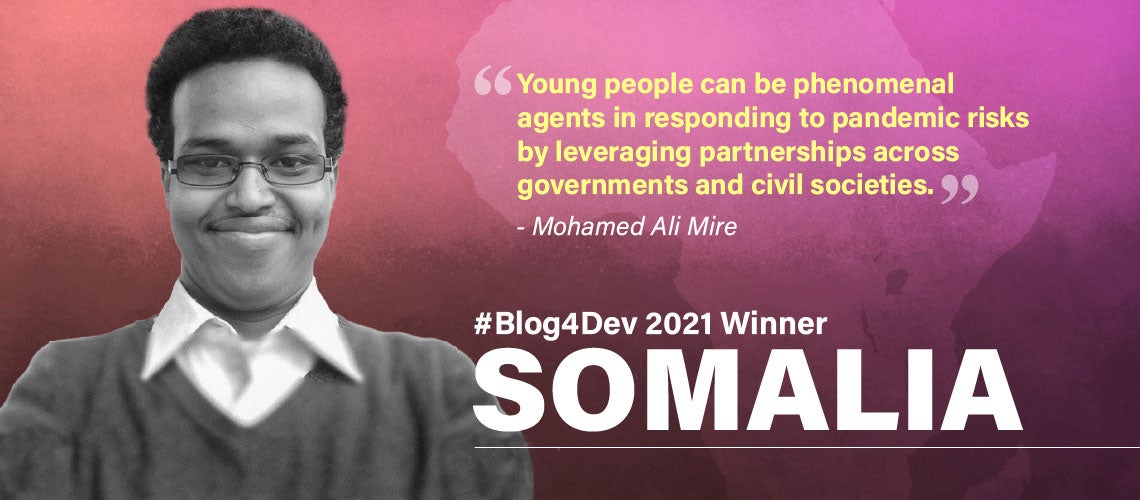 Mohamed Ali Mire is the winner of the 2021 Blog4Dev competition for Somalia.
Mohamed Ali Mire is the winner of the 2021 Blog4Dev competition for Somalia.
This is one of 38 winning blogs from the 2021 Blog4Dev competition, the World Bank Africa annual writing contest, inviting young people to weigh in on a topic critical to their country’s economic development. Blog4Dev winners responded to the question: How can young people work with their governments and civil society organizations to respond to the impact of COVID-19 and build a stronger post-pandemic economic and social system?
Young people can be phenomenal agents in responding to the pandemic risks by leveraging partnership opportunities across governments and civil society frameworks , technology and expertise to deliver sustainable solutions to communities, particularly disproportionately affected people, to foster their resilience to impacts of COVID-19 (coronavirus).
On October 27, 2020, the Ministry of Health of Somalia recorded 104 deaths, 3,941 confirmed cases and 3,185 recoveries from COVID-19. Despite the international support, Somalia has a weak healthcare system failing to deliver a high-quality service to its citizens to live in a decent life nurturing human development and inclusive growth.
#Engage in a supportive and impactful volunteer work
Youth in collaboration with their respective governments could do and run a volunteer work in many impactful schemes: For example, working for the public at COVID-19 facilities where personnel with specialties can do a supportive work ‘free of payments’ like COVID-19 hotline centers.
#Push action to waive or devalue utility bills
Somalia is among the leading countries with high cost of electricity due to weak power regulatory instruments. A kilowatt of power can cost as high as one dollar per hour in the country's capital, according to Aljazeera report in 2016. In the light of pandemic, youth can unlock productive policy engagement with their relevant authorities to either waive tax on or decrease basic utility bills for low income households and people with disabilities or preexisting health conditions like diabetes.
#Organize fundraising events
Youth in solidarity with COVID-19 victims can organize and contribute to impactful fundraising events like walking, running, swimming, or other engaging and exciting activities where all folks with generous hearts and cooperative minds can be invited to support people who are at risk of COVID-19 such as poor household income families, people with disabilities, and those living with preexisting conditions like cancer or diabetes.
#Scale up raising awareness and advocacy themes on COVID-19
By leveraging technology and social media platforms, youth can increase awareness and education campaigns on the possible ways of preventing the risk of COVID-19: For example, teaching basic hygiene and hand-washing practices. Furthermore, youth in partnership with music and art industry can invent education entertainment themes on COVID-19.
#Set up partnership framework with public and private sector
Youth in partnership with both public and private sectors can build up mobile shelters for Medicare facilities, low income communities, and people with disabilities. In addition, youth can leverage and optimize cooperative partnership facilities to deliver safe and affordable anti-COVID-19 kits like facemasks, sanitizers, and gloves to those that pay huge cost to afford basic services.
#Can empower unskilled youth and women
Young people can forge a supportive partnership framework with civil society facilities to secure financing instruments to teach unskilled, low-income youth and women sustainable skills, enabling poor and unskilled youth in acquiring most in-demand jobs in the market to support their livelihoods and families, and consequently contribute to the economic growth and development in the country.
Mohamed Ali Mire is the 2021 Blog4Dev winner from Somalia. See the full list of 2021 Blog4Dev winners here, and read their blog posts.


Join the Conversation